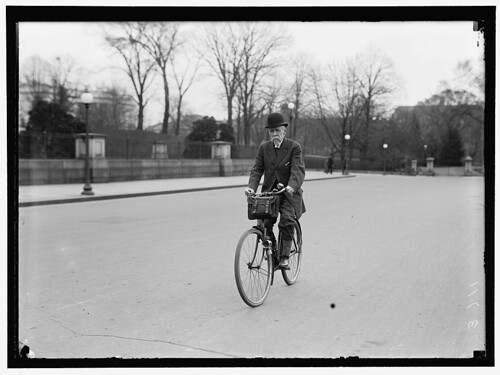Frontline Diplomacy: The Foreign Affairs Oral History Collection of the Association for Diplomatic Studies and Training at the Library of Congress makes available interview transcripts from the oral history archives of the Association for Diplomatic Studies and Training (ADST). These transcripts present a window into the lives of U.S. diplomats and the major diplomatic crisis and issues that the United States faced during the second half of the 20th century and the early part of the 21st.Full text search of these items is part of using the simple "one box" search for the entire website. This leads to what seems to me to be an amusing result - a suggestion the there is a significant linkage between diplomacy and bicycling. If you search "bicycle" across the entire LOC.gov site, the search results indicate that of the "sites and collections" within LOC.gov, Frontline Diplomacy is in sixth place as a "site or collection" for this search term. What this actually indicates is that if you ask 1,700+ people to talk about their life story, it isn't uncommon that they will mention "bicycle in passing, often for these 20th century diplomats in the context of "I rode a bicycle to school" type statements. (The most that "bicycle" appeared in any interview was three times - much more typical was one mention.)
Even my father, someone who I don't recall ever seeing ride a bike, mentioned "bicycle" twice in his interview! His interview is not about policy so much as anecdotes of life in the foreign service. One "bicycle" event was in Tunis:
For example, in the early summer of 1951, I bought a lovely 20 x 14 foot Kairouan carpet — all white. That fall, the U.S. Sixth Fleet paid a visit to Tunis — that is to say that Admiral Gardener and his carrier, the Coral Sea, anchored some miles off shore (Tunis is a shallow road stand). Anyway, at one point the Admiral and many of his colleagues ended up at my house — until about four A.M. — when the last was fished out of the pool and sent on his way. As you can imagine, many an hors d'oeuvre was ground into my Kairouan carpet. When I finally staggered out of bed the next morning, Ali, my cook, said that someone had stolen the carpet. He had not wished to disturb me, but he had washed the carpet and hung it out to dry, and someone had rolled it up and fled with it on a bicycle. So — that was the last I ever saw of the Kairouan carpet.Another mention was of his work in Moscow in the 1950s as a General Services Officer:
As General Services Officer (or housekeeper), I had some sixty Russians working for me, only one of whom spoke any English. The rest were carpenters, mechanics, painters, plumbers, laborers, what have you. Two things happened immediately — I changed the sign on my door to read “Genial Services” and, secondly, I set out to work with my “team.” I won't say we were totally successful. We tried to keep people (including Mrs. Bohlen) happy by doing what we could. And, I think, by and large, we succeeded. There were, of course, some people who could not be kept happy. Like the Air Force Attache (departing) who called up in a rage one day because we had dismantled his daughter's bicycle to be shipped home. Did we realize it would cost him money to have it reassembled in the U.S.? We put it back together for him — forget the U.S. taxpayer.So while there are some mentions of bicycles in these materials, arguably diplomatic history is not, as perhaps suggested by the search system, a rich source of information generally about bicycles.
I am reminded that while I don't recall my father riding a bicycle, I do remember his putting a bicycle together. While living in Bucharest in the 1960s, the U.S. Embassy community included (all things considered) a relatively large number of children roughly my age - I don't know how this was done, but a number of Raleigh Grand Prix bicycles were purchased and imported by the parents of many of these children one Christmas season. My father, being pragmatic in such things, had assembled the bicycle well in advance (he was also pretty good as a mechanic). But the night before Christmas I overheard him talking to someone in our house (my bedroom was at the top of the stairs above the diplomatic-reception-sized living room) and clearly assembling a bike. I learned years later that he was helping some American military attache by assembling the same sort of bike for the attache's child, the attache not having properly understood "some assembly required." This is somewhat ironic, I suppose.
As a tangential connection with cycling history, I have blogged before about the most famous U.S. diplomat-cyclist, Alvey Adee.

Alvey Adee of the U.S. Department of State riding his bicycle to work in 1914
No comments:
Post a Comment